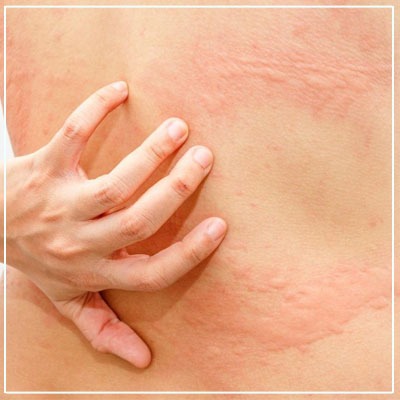Urticaria treatment in Mumbai
Urticaria
Urticaria, or hives, are red, raised, itchy skin rashes that are frequently triggered by an allergen or a skin reaction. They vary in size and emerge and disappear repeatedly during the reaction.
Acute (short-term) hives appear suddenly and disappear within a few weeks. If the rash lasts more than six weeks and recurs regularly throughout months or years, the condition is considered chronic. Chronic urticaria can be very uncomfortable and disrupt daily activities. Angioedema (painful swelling) of the lips, eyelids, and within the throat can also develop.

Urticaria affects 15–20 percent of people. Acute urticaria is frequent in children, and is usually caused by allergic reactions to food, drugs, insect stings, viral infections, or blood transfusions.
What causes it?
When an allergic reaction develops, the body produces histamine and other biochemicals, and capillaries (small blood vessels) leak fluid. Rashes are caused by the accumulation of this fluid.
Pain drugs, insects, infection, itching, heat/cold, stress, hormones, sunshine, exercise, alcohol or certain foods, pressure on the skin, underlying sickness such as thyroiditis, and so on could all be triggers. Heat, exercise, and stress can all increase the symptoms.
How is it diagnosed?
Physical examination and medical history are used to make a diagnosis. If a medication or food allergy is suspected, you may be subjected to blood tests, skin tests, or radioallergosorbent tests.
What is the Treatment for Urticaria?

Acute Urticaria: The basic treatment for acute urticarial is to avoid the trigger as much as possible.
Antihistamines are the first line of treatment.
In the instance of severe angioedema involving the throat, which causes difficulty breathing. The patient must be shifted to an emergency immediately.
Chronic Urticaria
Antihistamines: Hydroxyzine, cetirizine, levocetirizine, and fexofenadine are administered.
The majority of patients are managed with anti-allergic medications. Other immunomodulatory medications and biological therapies can be given.
Some Patients not responding to antihistamines can be managed with Oral steroids, cyclosporine.
A newer molecule injection OMALIZUMAB is given to very severe cases.
For more information & consultation on Urticaria treatment in Mumbai , visit VIVA Aesthetic Clinic at Opera House or contact us on 022 3573 1556 | 93245 89084 or simply fill in your name and number & one of our team member will get in touch with you soon. Our team of experts along with Dr. Deepam Shah, MD. DNB. FAM – Dermatologist, Cosmetologist & Hair Transplant Surgeon, will help you out in understanding your problem and guide you through every stage of your treatment.
At Viva Aesthetic Clinic, we offer Hair transplant, Aesthetic treatments and skin care with the help of latest technology, world class procedures and a dedicated team led by Dr.Deepam Shah . We are your one-stop clinic in India for comprehensive Hair Restoration, cosmetic laser treatment and skincare solutions.
